Problems of the Irish Revolution
Can the IRA meet the challenge?
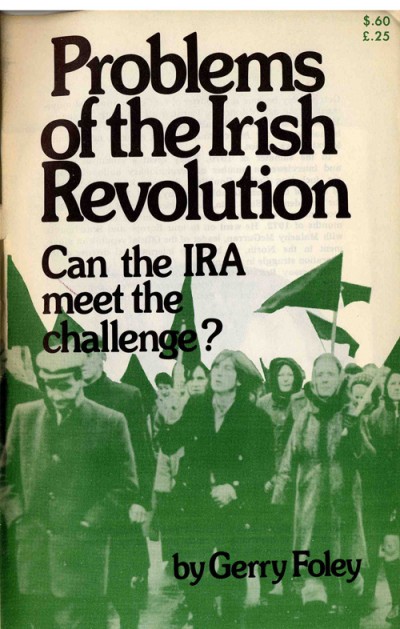
| Date: | August 1972 |
|---|---|
| Publication: | Intercontinental Press |
| Author: | Gerry Foley |
| View: | View Document |
| Discuss: | Comments on this document |
| Subjects: |
Please note: The Irish Left Archive is provided as a non-commercial historical resource, open to all, and has reproduced this document as an accessible digital reference. Copyright remains with its original authors. If used on other sites, we would appreciate a link back and reference to The Irish Left Archive, in addition to the original creators. For re-publication, commercial, or other uses, please contact the original owners. If documents provided to The Irish Left Archive have been created for or added to other online archives, please inform us so sources can be credited.
Commentary From The Cedar Lounge Revolution
11th December 2011
This document, printed in 1972, provides an overview by US activist and journalist Gerry Foley. Foley who worked for Trotskyist publication, Intercontinental Press spent some time in Ireland in 1970 and in 1972 meeting and interviewing ‘revolutionary nationalist leaders, including Cathal Goulding, the man known as the chief of staff of the Irish Republican Army, and Tomas MacGiolla, the President of Sinn Féin, the political arm of the republican movement.’
When he returned ‘in the turbulent early months of 1972… he went on to tour Europe and Scandinavia with Malachy McGurran,leader of the Official Republican movement in the North, to build an international defines of the liberation struggle in Ireland’.
The document itself is drawn from an essay that first appeared in Intercontinental Press in 1972.
In the introduction Foley outlines the circumstances that led to ‘in May-June 1968, a mass movement develop[ing] among the nationalist minority in Northern Ireland.’
And he notes ‘the rise of this movement also reflected other changes that had been accumulating beneath the surface. After the failure of the 1956-62 guerilla campaign, the traditional nationalist movement, the IRA, had been forced to rethink its historic positions. In this process it moved away from concentrating exclusively on guerrilla warfare in the name only of national unity and full independence. It began to develop a program of political action based on the immediate needs and aspirations of the mass of the people.’
He continues:
One of the first effects of the massive fighting that developed in August 1969 was a split in the IRA. The rise of communal warfare encouraged some veterans of the 1956-62 campaign, who had been opposed or indifferent to the new orientation, to break away from the Official movement and forma Provisional IRA. Although they too have been changing under the pressure of the situation, the Provisionals have generally stressed military action as the main form of fighting the oppression of the Catholic community. The Officials have tried to combine commando group activity with peaceful mass action.
And he notes:
In general the distinction between the two groups has been seen in terms of mass action vs. Guerrilla warfare. Smaller socialist groups, which had tended to discount the revolutionary potential of democratic demands, have found themselves either isolated or drawn into the orbit of one or the other militant nationalist organisation, since this was the arena where the struggle for leadership was centred.
And he concludes:
If traditionalism is not dead yet, the pressure of events and the spread of new ideas seems to have dealt it a mortal blow. In the future any radical organisation will have to stand on its political program and not its historical credentials.
In the main body of the article he discusses the then recent declaration by the Official IRA in May 19, 1972, that it was ‘suspending armed offensive operations in Ulster’. And he attempts to parse out the meaning of that statement both in terms of its direct impact and its future implications. What is of particular interest is the way in which Foley points to a range of actions, including the death of an OIRA volunteer, Martin O’Leary, during the Mogul silver mine strike in 1971 and position this within the developing approach of Official Republicanism.
He also notes the various influences on Official Republicanism from ‘British ultra-leftist and workerist groups [in Derry]’ to ‘Stalinism’ and the ‘scholastic fuzziness… of the British Communist Party’. And he argues that there is a danger that ‘since the civil rights movement has not proceeded as expected and the republican leadership was evidently not prepared politically for the actual results - that disorientation will set in’.
And intriguingly given later developments in OSF he argues that:
By its devotion to the ideals of socialism and its uncompromising fight against all the conservative forces in Ireland, the Official republican movement has won the support of a large number of dedicated revolutionary youth. By waging centralised political campaigns and by giving clear political direct, it can weld these youth into the best fighting force in Europe. The main instrument of this process, however, cannot be an ‘army of the people’; it must be the party of the Irish revolution.
That his analysis is critical but sympathetic is particularly useful in getting a sense of the time.
More from Intercontinental Press
Intercontinental Press in the archive
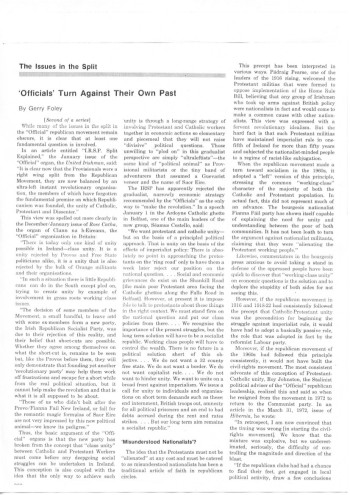
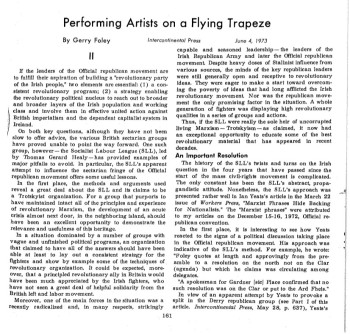
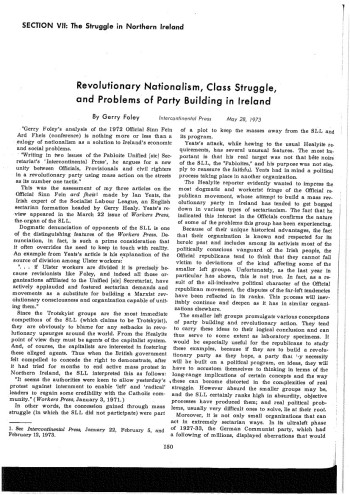
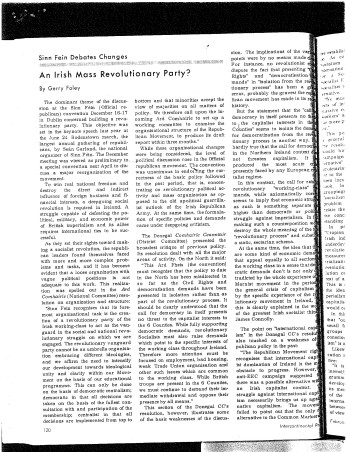
Comments
No Comments yet.
Add a Comment
Comments can be formatted in Markdown format . Use the toolbar to apply the correct syntax to your comment. The basic formats are:
**Bold text**
Bold text
_Italic text_
Italic text
[A link](http://www.example.com)
A link
You can join this discussion on The Cedar Lounge Revolution
By: the national question and self-determination a compilation of links « Philly Workers' Voice Blog Sun, 22 Apr 2012 12:47:07
[…] Problems of the Irish Revolution; Can the IRA meet the challenge? A Socialist Workers Party pamphlet by Gerry Foley […]
Reply on the CLR
By: Brian Hanley Sun, 22 Apr 2012 16:30:47
Very sorry to hear about Gerry Foley’s death. He was generous to myself and Scott Millar when we started researching the Lost Revolution. His two pamphlets and various articles (usually in Intercontinental Press) about the Officials in the early 70s are well worth reading. His interviews with Tomas Mac Giolla and Cathal Goulding are particularly good for a snapshot of their movement in a particular time and place. His obituary for Liam McMillen is also an impressive article.
Reply on the CLR
By: Gerry Foley, Socialist and Republican: 1939 − 2012 « The Cedar Lounge Revolution Mon, 23 Apr 2012 15:52:10
[…] his life. As a socialist with a profound interest in Ireland and matters Irish and as the author of a number of pamphlets directly linked to that his views of the situation, particularly in the early to mid 1970s are of […]
Reply on the CLR
By: Left Archive: Ireland in Rebellion, Gerry Foley, Including Interviews with Cathal Goulding, Chief of Staff IRA and Tomás Mac Giolla, President, Sinn Féin. March 1972 « The Cedar Lounge Revolution Mon, 30 Apr 2012 01:38:48
[…] in March 1972 this document was written by Gerry Foley who passed away last weekend. It complements another document written by him during the same period which analyses aspects of the conflict on the island. Foley at […]
Reply on the CLR
By: Jim Monaghan Mon, 30 Apr 2012 11:47:05
In reply to Brian Hanley.
If Gerry wrote a history of the Sticks he could easily have called “Lost leaders of the Irish Revolution”
Reply on the CLR
By: Left Archive: Selection of writings on the Official Sinn Féin/Irish Republican Socialist Party split in 1975 – including a tribute to Billy McMillen and interview with Séamus Costello, by Gerry Foley « The Cedar Lounge Revolution Mon, 04 Jun 2012 02:52:19
[…] documents were written by Gerry Foley (see here and here) for Intercontinental Press between 1974 and 1975 about the split in Official Sinn Féin which […]
Reply on the CLR
By: the national question and self-determination a compilation of links « Resistance! PHL Tue, 31 Jul 2012 00:34:03
[…] Problems of the Irish Revolution; Can the IRA meet the challenge? A Socialist Workers Party pamphlet by Gerry Foley […]
Reply on the CLR